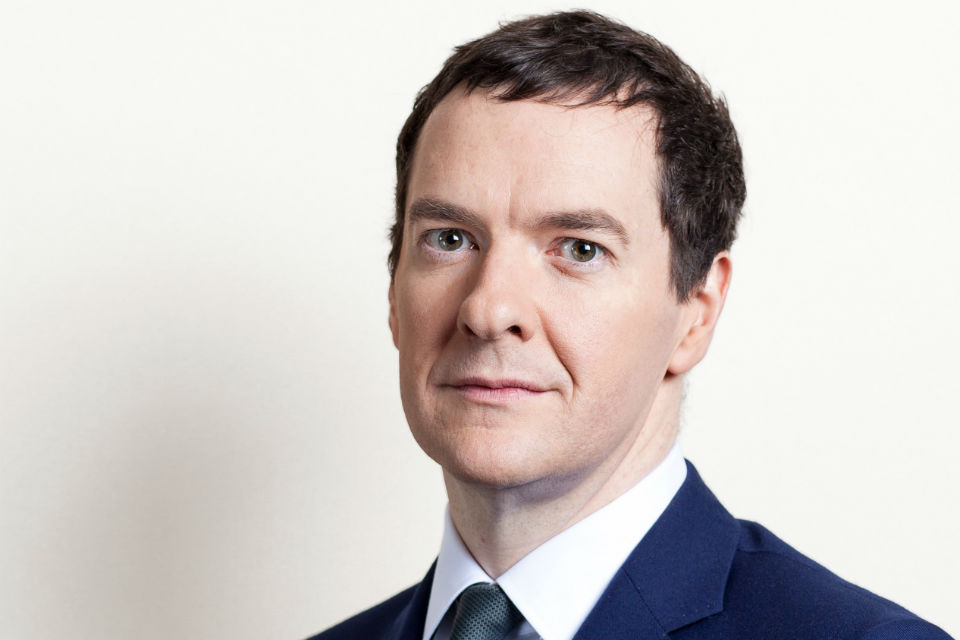Remarks by the Chancellor at the Efficiency and Reform Group event on government savings
'We’ve made excellent progress and have now shown that we can deliver savings and reforms year after year', explains the Chancellor.

Ladies and gentlemen – welcome to the Treasury.
I say the Treasury, because it was the Treasury when I started my role, but now of course it is home to a number of government departments, precisely because of the work that we have done and it’s good to be doing this event in the week of the Mansion House speech.
We promised we would do what every business and every family in Britain has had to do – look at our costs and find savings.
I said: “We will freeze large IT contracts, take out discretionary spend, not fill posts that become available in the back office, renegotiate contracts, rationalise property”.
And that is exactly what you Francis and your team have done.
The situation in 2010 was pretty dire:
- Government spent a staggering £2.4 billion on consultants and contingent labour
- We were spending approximately £45 billion on procurement without knowing who our major suppliers were, nor how much was being spent with each of them
- Our use of property wasn’t coordinated. In Bristol alone central government had over 100 different addresses while we were sitting on vacant property elsewhere
- We’re spending around £7 billion a year on IT but our approach was antiquated. One department paid £30,000 to change a single word on a website. And one was paying over seven times more than another for a simple black printer cartridge
- Only a third of major projects were delivered to time and on budget
So we worked to address this from day one. It’s all part of our long-term economic plan to ensure the country lives within its means.
Francis Maude has led an agenda working closely with the Treasury, and of course out of the Cabinet Office, to drive these efficiencies across Whitehall.
And Francis it has been a heroic task and I congratulate you on it.
We have more than met the targets we set.
Today I am pleased to announce that for 2013-14 we saved £14.3 billion by reducing the cost of government against the 2009-2010 baseline.
This comes on top of the billions of extra revenue from tackling fraud, error and debt.
We have saved over £5 billion through procurement reform, £3.3 billion by reforming our approach to delivering projects and construction and £4.7 billion by reducing the size of the civil service and reforming public sector pensions.
Indeed, the Civil Service is now at its smallest size since the Second World War – down 16% since 2010 and working with greater productivity and I pay tribute to the hard work of Civil Servants in this building and across the government.
We have reduced the number of quangos and public bodies by almost a third.
Our Major Projects Authority is working to assure around 200 of the government’s biggest projects.
And we have tough controls on our IT spending so departments now have to buy technology that works together.
At the same time we have created a world-class digital presence with gov.uk – and this is a remarkable achievement by government and everyone involved -beating the Shard and the Olympic Cauldron to win a coveted design award.
By next year 25 of the biggest public services will be digital showing that we can improve the quality of services for the public even as we make savings.
Back in 2010 small businesses were almost excluded from winning government contracts – next year they should be getting a quarter of our business.
None of this efficiency work is glamorous or particularly headline-grabbing. It’s a dull hard grind much of the time. But it delivers and it matters.
We’ve made excellent progress and have now shown that we can deliver savings and reforms year after year. But there’s still more to do. There’s a job to finish.
That’s why at the Budget we asked Francis to set out an ambitious new efficiency programme to deliver savings from 2016-17 and across the next Parliament in time for Autumn Statement 2014.
The government is firmly on the side of hard-working people. We know we need to spend taxpayers’ money responsibly. Thank you again for what you have done – many of you in this room – to deliver this impressive achievement but there’s more to do.